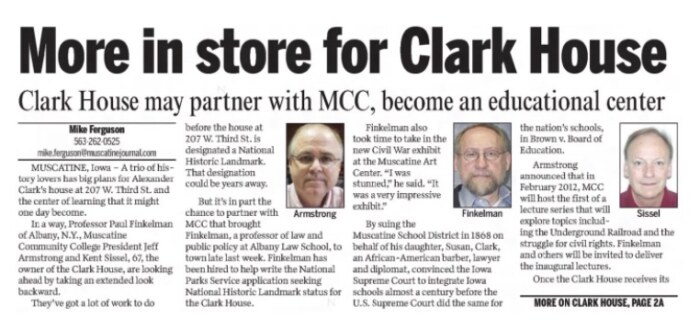This column by Daniel G. Clark about Alexander Clark (1826-1891) first appeared in the Muscatine Journal.
A headline that could have been repeated many times over the years: “Alexander Clark project in jeopardy.”
“[E]fforts to restore his 100-year-old house on West Third Street are jeopardized by a shortage of interest and funds.”
That sentence, too, could have been recycled across the 44 years since it appeared in the Iowa City Press-Citizen on November 25, 1978.
“Mrs. [Burtine] Motley and a few others have been trying for four years to save the crumbling, two-story brick duplex, which was moved a [half] block west from its original location in 1975 to make way for a low-income housing project. But residents and city officials are weary of looking at the dilapidated structure. They’ve given Mrs. Motley’s group a Dec. 1 deadline to begin repairs or face demolition of the house.”
“Few people in Muscatine had heard of Clark until preparation of a survey of historic homes for the nation’s Bicentennial revealed that the building was to be razed to make room for the high-rise housing project. It was then that Mrs. Motley’s group purchased the house from the city and arranged to move it. … Little has been done to improve the property since.”
“If the society’s efforts are unsuccessful, Mrs. Motley said, ‘We might consider an offer (to buy the property). We want to see the house saved. That’s the essential thing. We had hoped to refurbish half the house for school children for the study of black history and inter-human relations.’”
Muscatine Journal editorial, December 8, 1978: “The Journal editorially supported the high-rise project, and we editorially urged that the building be named in honor of Alexander Clark. The Clark House, a project for the living, is a fitting memorial for a man who made important contributions to this community, state and nation, in civil rights, and in politics.”
“A committee of local citizens has raised funds for a commemorative plaque in the Clark House to recognize his contributions to this nation. We believe that could better serve the purpose than the prolonged efforts which have been made to restore the home as a historical monument.”
Muscatine Journal, December 22, 1978: “The group owning the Alexander Clark home was granted yet another extension on the property’s demolition by the Muscatine City Council last night after a representative of the group made a surprise announcement of plans to sell the structure. … Jean ‘Duffy’ DeFrance…announced the society’s decision to sell the home. She said the society has ‘several good prospects’….”
The announcement “was seen as a reaction to pressure from the state historic preservation office.”
The reprieve postponed demolition until March 7, 1979. On March 9, the Journal reported a “tentative” sale to historic preservationist Kent Sissel.
Muscatine Journal editorial, May 13, 2006: “Sissel bought the house in 1979 and restored it. He lives in part of it and rents out the other rooms. He still hopes the home can be turned into a museum and research center. That’s a worthy notion.”
In July 2010, the Journal reports that the state preservation office is funding research to nominate the house as a National Historic Landmark. One of project’s scholars is Dr. Paul Finkelman.
“Finkelman, who’s taught and written extensively on race, slavery, civil rights and baseball, is keynote speaker this week at the 2010 National Underground Railroad Network to Freedom conference in Topeka, Kan., which Sissel and Dan Clark plan to attend. Sissel said Finkelman also plans to speak in Muscatine in September.”
“If the application is successful, Sissel said he doesn’t plan to stick around and show visitors around his famous home. He’d rather an academic institution run the place.”
Muscatine Journal headline, July 11, 2011: “Clark House may partner with MCC, become an educational center.” Muscatine Community College President Jeff Armstrong “announced that in February 2012, MCC will host the first of a lecture series that will explore topics including the Underground Railroad and the struggle for civil rights. Finkelman and others will be invited to deliver the inaugural lectures.”
“MCC students and others could learn about many disciplines there, both Finkelman and Armstrong said, including historic preservation, the art of taking oral history, research and other skills—even construction.”
In 1979 Burtine Motley described what the Press-Citizen called “another stumbling block”: “We have had to create an awareness of who Clark was.”
Today Paul Finkelman still calls Clark “the most important African American leader who almost no one has heard of.”
Finkelman presented the Alexander Clark Lecture on Monday, February 27, 6 p.m., at MCC Student Center (link to live-stream here). He also spoke at Muscatine Rotary Club that noon.
On Sunday, February 26, the Alexander Clark Foundation staged a “Pop-Up Reception with Paul”—public welcome—in the lower gallery of the Muscatine Art Center, surrounded by the new exhibit “Faces of Hope: The Original Residents of the Clark House” by Bob Campagna.
Next time: The Clark-Lee-Mahin connection
Top image: Lead story in the Muscatine Journal on Monday, July 11, 2011.

